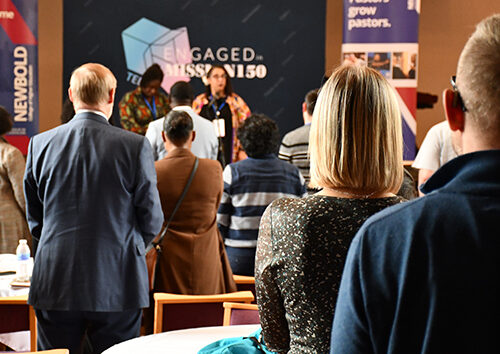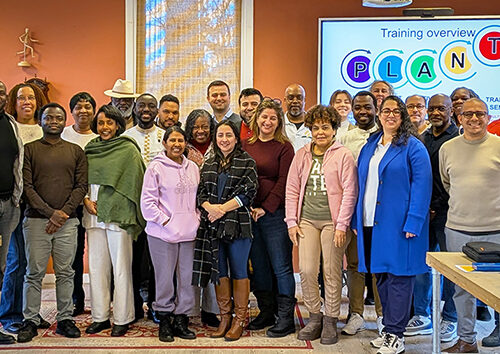28 April 2025 | Bracknell, UK [David Neal & Vanesa Pizzuto]
Over 160 Trans-European Division (TED) leaders, pastors, church planters, and evangelists gathered at Newbold College of Higher Education (NCHE) for Engaged in Mission 150. The event provided a platform to celebrate achievements, acknowledge challenges, and reaffirm the commitment to the future of mission work in Europe.
Organised jointly by TED and NCHE over the weekend of April 25-27, the conference addressed theological and missiological challenges currently facing TED. Attendees reflected on lessons from the past, aiming to shape today’s church life and witness. This report offers a brief overview of the depth of the discussions that took place during the weekend.
In his keynote opening address, Anthony WagenerSmith, TED Adventist Mission Director, likened the experience of today’s TED members to the Old Testament people of God, in exile and far from familiar territory. “This reality presents a unique opportunity for us to reimagine what it means to be a resurrected, counter-cultural, and missional community,” WagenerSmith remarked. “Only in exile,” he continued, “do we discover in fresh ways how to live as a faithful minority that grows wider and deeper, helping others prepare for Christ’s return.”
Remembering and Telling the Story
David Trim, Director of Adventist Archives and Statistics at the World Headquarters of Seventh-day Adventists, shared that during the 20th century, the Northern European Division (now TED) “sent nearly 1,000 missionaries from Europe to other parts of the world, where they adapted to local languages, cultures, and customs.” This raised a key question for Trim: “Do we still have the same ironclad determination to reach Europe that the Division’s founders and early leaders had?” He then posed another challenge for European Adventists: “To what extent is Adventist mission in Europe contextualised, and to what extent have American presumptions been applied?”
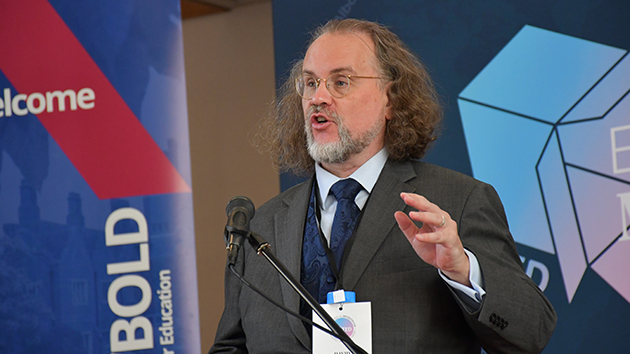
The Historical Role of Women in Mission in the TED
“Women have been vital to the mission of the church, particularly in Europe,” said Heli Otamo-Csizmadia, who highlighted the roles of women as pastors, missionaries, educators, and spiritual leaders for over a century. Using the example of Alma Bjugg, Otamo-Csizmadia emphasised that these women represent a quiet but powerful legacy of God’s call. “Their ongoing presence challenges the church to fully embrace and affirm what history has long made clear: that women have always been—and continue to be—essential to the life and mission of the church.”
In a stirring and moving reflection, Otamo-Csizmadia was later joined by Dragoslava Santrac, Managing Editor of the Encyclopedia of Seventh-day Adventists, Sven Hagen Jensen former missionary to the Middle East and Nigeria, and Catherine Anthony Boldeau, British Union Conference (BUC) Stewardship Director. Together, they shared the stories of Elsa Lukkanen, Christian Johannes Jensen, and Donald and Anne Layle, each highlighting values of commitment, humility, and sacrifice. In the case of the Layle family, this sacrifice was tragically ultimate, as they lost their lives in service on 3 February 1981.
Building a theological foundation for mission, Santrac went on to explore the Old Testament’s foundational role in mission theology—often overlooked in favour of the New Testament. “A missional interpretation of Scripture,” suggested Santrac, “views the entire Bible as telling the story of God’s mission through His people, engaging with the world for the sake of all creation.” She challenged the participants: “How do the creation narrative and the Messianic hope guide our mission in the world?”
Throughout the event, interspersed with lectures, were open forum discussions and opportunities to share personal stories in smaller groups.
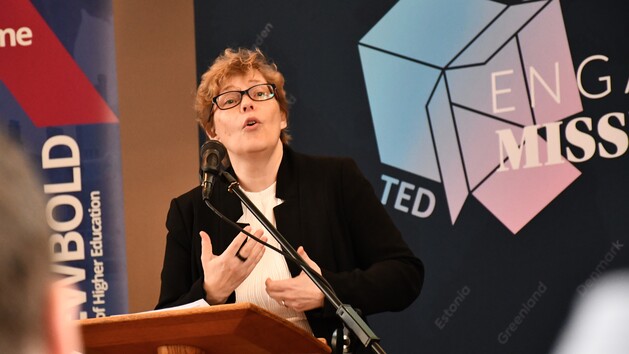
Learning from the Past
With TED’s mission spanning over 96 years, time was dedicated to considering both the mindset of European missionaries who sent Adventist outreach to other parts of the world and the immigration of Adventists from around the globe into TED. A challenging and painful question was raised by Val Bernard-Allen: “Did some European missionaries serve with colonial mindsets?” Acknowledging that we are all products of our time, Bernard invited participants to take a deeper look and ensure that the minds of today’s missionaries and leaders are free from any vestiges of colonialism. “Colonial mindsets,” Bernard-Allen suggested, “should seek transformation.”
Anthea Davis-Barclay shared the story of African-Caribbean immigration to Britain in the aftermath of World War II, when workers from the colonies were invited to help with national reconstruction. “Among the significant migration of Caribbean people to the UK, many identified as Adventists,” said Davis-Barclay. She went on to tell the difficult and painful story of how African-Caribbean Adventists navigated connection, belonging, and participation in church life with the British Adventist community. Through extensive research, including interviews with members from both sides of the 1960s–1980s divide, Davis-Barclay revealed the tensions that came to a head in the mid-1970s, when the General Conference, under the leadership of Robert Pearson, was asked to intervene and offer solutions. “Critical to that conversation,” shared Davis-Barclay, “was black representation in leadership—pastoral, conference support staff, directors, and leaders.”
With reflective humour, humility and diplomacy, Davis-Barclay navigated this complex story, offering lessons for contemporary evangelism and church cohesion. As this session concluded, Pastor Tabitha Purple, Netherlands Union church planter, highlighted the ongoing significance of the BUC story, noting that most TED Unions are now facing “their own diversity challenges.” She appealed for lessons from the past to inform the future.
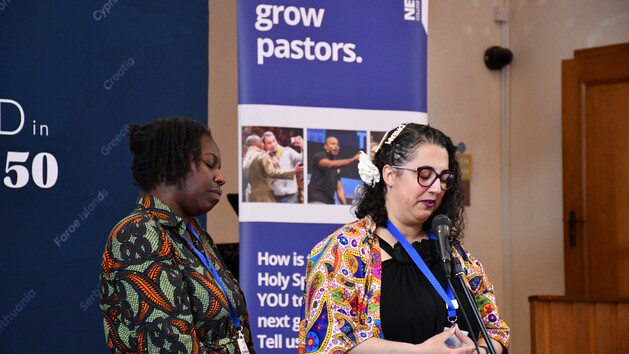
Christ, Consumerism, and Community in a Post-Christian Culture
Shifting from historical reflection to the present, the conversation turned to the challenges of living in a post-Christian culture. Brendan Pratt, Global Mission Centre Director for Secular and Post-Christian Mission, suggested that “consumerism has become the primary ‘folk religion’ in post-Christian culture.” Pratt views consumerism as “a spiritual disposition, a folk religion, and institutionalised selfishness.” However, he believes Adventism offers theological tools to address consumerism. “Is it possible,” Pratt challenged, “for consumerism to be addressed by a bigger imagination of what it means to be human? And can we, in post-Christian culture, be a counter-cultural biblical community that points people to a bigger imagination?”
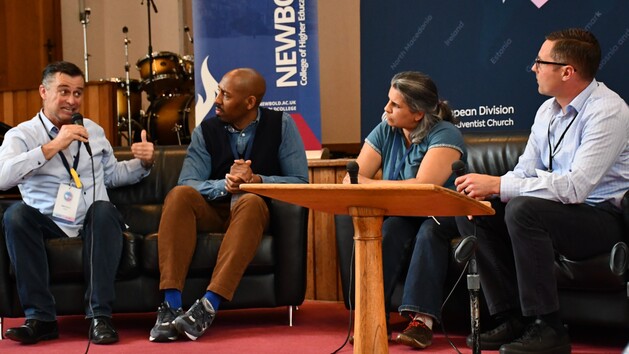
Michael Moynagh – Contextual Church Multiplication
As a visiting external lecturer, Rev Dr Michael Moynagh’s presentation on his vision for Soul Space was warmly received. He advocates for Christian mission in local communities and recognises the importance of connection in today’s world. With a list of verbs central to mission—listen, love, community, share Jesus, church, repeat—Moynagh emphasised the importance of prayer, ongoing listening, and building relationships with the wider church. “Soul Space” has the potential to reach those places traditional mission efforts have yet to penetrate.
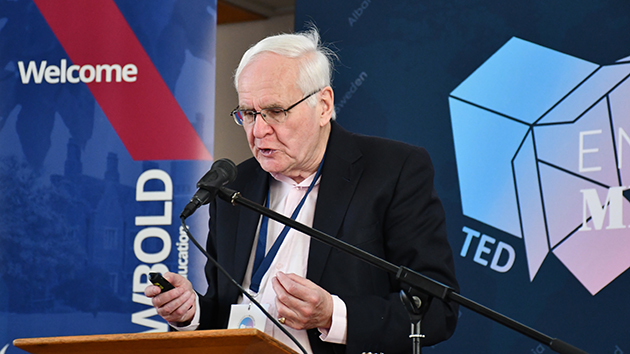
Worship, Friendship, and Sharing Together
While much of the event’s significance took place in the meeting rooms, what happened outside them was equally important. In a breakout room, members of a writing committee worked on a collaborative statement. Chaired by WagenerSmith, and including, Marianne Dyrud, Tabatha Purple, and David Trim, the committee produced a statement outlining the heritage, present reality, and future direction of TED mission particularly in the post-Christian fields.
The organisers stated that they hoped Mission150 would inspire a community of dedicated leaders, pastors, and church planters to join a TED-wide effort to understand, research, and address the challenges of secular, post-Christian mission in Europe. They added that they aimed to offer support and guidance to the wider global Adventist community as similar demographic and cultural trends began to affect other regions.
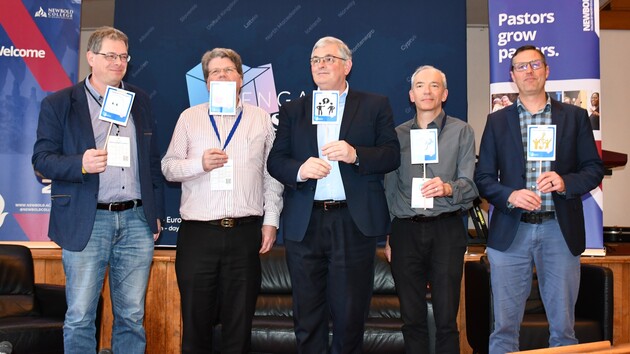
[Photos: David Neal and Vanesa Pizzuto/ Adventist Media Exchange (CC BY 4.0)].
